By Ray Urbanic, Vice President of Engineering
Production systems continue to grow and evolve, but the electrical equipment providing them safe power eventually runs out of circuit breakers. The facility’s original switchgear, installed over 40 years ago, requires an upgrade. However, none of the new lineups appear to be a fit. Traditional switch-and-fuse protection used for decades now seems to create greater coordination and arc flash issues today. Production demands continue to grow annually, but the maintenance budgets continue to thin.
If any of these statements seem to apply to your facility, there is a need for your existing electrical protection system to receive an update. The problem is answering the following: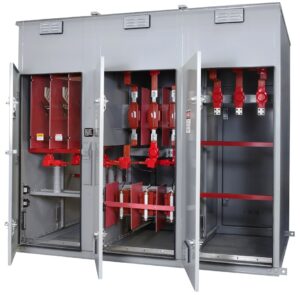
- How much will it cost?
- Can you install it within a short outage?
- Will it mesh well with the rest of the system?
The type of switchgear applied will have a profound impact on the answers to these questions. This can be the difference between a project approval or delay.
Cost Effective:
Fused load-break switch lineups are among the most cost-effective and have the smallest overall footprint, but users should avoid operating this equipment more than a few times annually. They can also often present coordination and/or arc flash challenges.
Traditional:
Traditional metal-clad circuit breaker switchgear most consider top-tier. Not only is it one of the costliest options but also requires significant footprint space.
High-Duty operation:
Motor control centers offer high-duty operation as well as solid protection for frequently controlling motors. The drawback of these devices lies in their amperage limitation, capping out at a maximum of 650 A, and their voltage restriction, which reaches 7.2kV.
Medium Voltage Hybrid:
Medium Voltage “hybrid” Switchgear can offer the best of all worlds. The design utilizes a common load-break switch as a visible disconnect, coupled with either a fixed-mounted circuit breaker or contactor, with added relay protection. This ends up being a “hybrid” between IEEE standards C37.20.2, 20.3, and UL 347, and can offer some significant benefits:
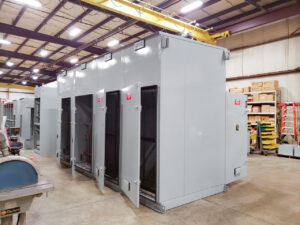
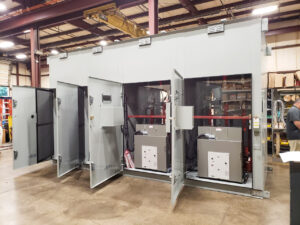
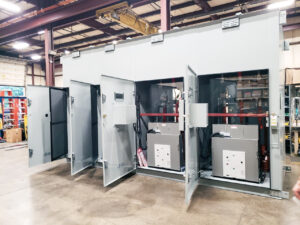
Benefits:
• Compact Design: Applying fixed-mounted vacuum circuit breakers or contactors within the small footprint of a custom load-break switch enclosure allows for direct replacement of existing equipment, matching existing cable conduit layouts and pad dimensions. As a result, when you significantly reduce installation time, it allows for shorter overall outage windows. The front-access design allows this equipment to be located against a wall or in limited space.
• Expanded Application: Applying the “hybrid” load-break switch with a fixed circuit breaker can create a higher-capacity motor starter, rated up to a full 15 kV and 1200 A, users can now exceed the limitations imposed by the power fuse and/or contactor ratings.
• Higher Duty Cycles: Including a fixed vacuum circuit breaker or contactor with the load-break switch shifts the heavier duty-cycle burden to the breaker/contactor. This preserves the life of the load-break switch.
• Superior Coordination: Including independent relay protection with the fixed-mounted circuit breaker (in lieu of fuses) allows for greater sensitivity and allows for tighter coordination on the downstream substations.
• Reduced Arc Flash Energy: This improved protection sensitivity can also allow for faster clearing times of lower-level fault currents, limiting the potential incident energy that can be available at the downstream equipment and lowering the level of required personal protective equipment (PPE) required by users.
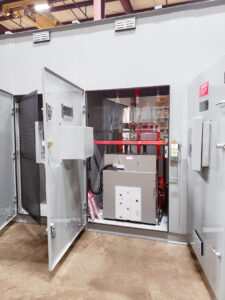
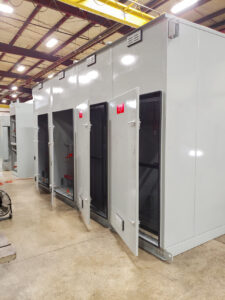
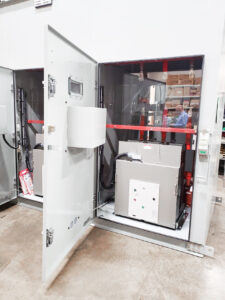
Case Study #1:
An original 11,000-480/277 V, 3750 kVA transformer is approaching its end of life. It is being upgraded with a 5000 kVA transformer for future expansion. The existing load-break switch protected the 3750 kVA transformer with three 300E-rated fuses. Unfortunately, there are no available fuses at that voltage that can protect the 5000 kVA transformer. The arc flash rating of the downstream 480 V equipment is labeled “Dangerous”. This is due to the incident energy being far above 40 calories per square centimeter. Experts are evaluating Metal-clad switchgear as a protective solution for the new 5000 kVA transformer.
Solution: A hybrid 15 kV-rated load-break switch with a fixed-mounted 600 A circuit breaker and relay can be installed in the same place as the existing fused load-break switch. Not only can the hybrid switchgear provide full over-current protection for the 5000 kVA transformer, but a coordination study shows that the new relay settings can also be set to greatly reduce the clearing time of any downstream arcing faults at the 480 V equipment, thus reducing the incident energy rating well below 20 cal/cm2.
Case Study #2:
Three existing 2400 V, 3000 HP motors have been traditionally protected by upstream circuit breakers, being started across the line. The motors have each experienced significant stress on their windings and have failed several times. We are installing a new variable-frequency drive (VFD) to facilitate motor startup while minimizing stress on the system. Due to space constraints, the drive is located near the motors. Regrettably, the available space does not accommodate the new metal-clad switchgear required to supply power to the variable frequency driver (VFD).
Solution: A hybrid 5 kV-rated load-break switch with a fixed-mounted 1200A circuit breaker can be applied within a compact, front-access enclosure close-coupled to the VFD. In the event of a detection, the VFD controls coordinate with the breaker control circuit to trip. This results in minimal impact on the existing floor space.
Southwest Electric has been creating and applying hybrid switchgear designs for a variety of custom solutions. Our team of engineers is happy to discuss your unique applications and offer custom solutions that meet various needs.
Visit our YouTube page to learn more about switchgear!
